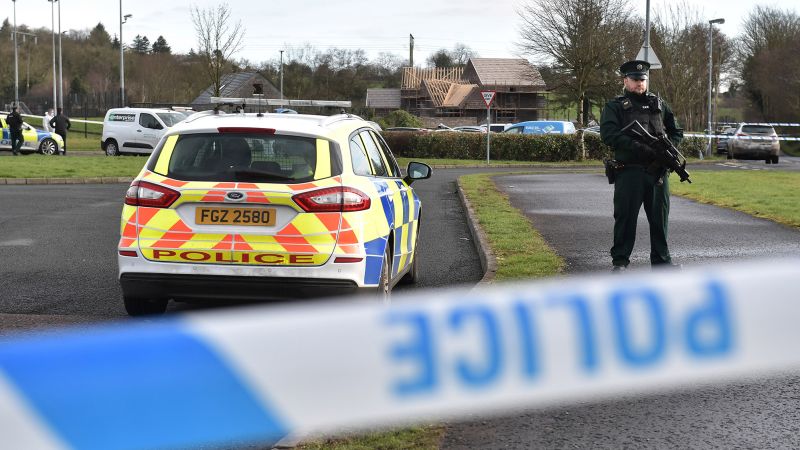

London
CNN
—
The terrorism threat level in Northern Ireland has been raised from “substantial” to “severe” just days before a potential visit to the country by US President Joe Biden.
The decision to change the threat level to “severe,” meaning an attack is highly likely, was made by the UK’s MI5 security service and announced by UK Secretary of State for Northern Ireland Chris Heaton-Harris on Tuesday.
Heaton-Harris said the move was made after an increase in “activity relating to Northern Ireland-related terrorism” including the attempted murder of a high-profile police officer last month. While the public should remain vigilant, they should not be alarmed, he said.
Detective Chief Inspector John Caldwell was shot several times by masked men in front of his son and other children at sports complex in Omagh, County Tyrone, in late February.
The Police Service of Northern Ireland’s (PSNI) Assistant Chief Constable Mark McEwan said at the time that the force’s primary focus was on “violent dissident republicans,” and a number of people have been arrested since the attack.
“The political future of Northern Ireland rests with the democratic will of the people and not the violent actions of the few. Together we will ensure there is no return to the violence of the past,” Heaton-Harris said Tuesday.
The change in the threat level comes weeks before a possible visit to Northern Ireland by US President Joe Biden to mark the 25th anniversary of the Good Friday Agreement (GFA), also known as the Belfast Agreement, which brought an end to decades of sectarian violence between Irish republicans and unionists known as “The Troubles.”
The 1998 deal was brokered with the assistance of then-President Bill Clinton, who will also visit Northern Ireland to mark the occasion. Biden, who is of Irish descent, has repeatedly made clear that peace on the island of Ireland is important to him. He made these comments in the context of Brexit, which many warned would lead to renewed tensions in Northern Ireland.
Tensions have long existed between unionist communities, who support Northern Ireland being part of the United Kingdom, and republicans, who would prefer Northern Ireland to unite with the Republic of Ireland. The GFA brought these communities together in a compromise that largely ended The Troubles.
A key part of the agreement is that the country’s power-sharing government must be comprised of politicians from both communities. However, the Northern Irish government has not sat since October of last year for various reasons, including the fallout from the Brexit trade deal that was agreed when the UK left the European Union.
The Democratic Unionist Party, the largest unionist party, doesn’t like the status that the UK government’s Brexit deal has imposed on them. It was agreed by both the UK and the EU during Brexit negotiations that there should be no hard border between the Republic of Ireland and Northern Ireland. While it’s not explicitly outlined in the GFA that there should be no border, it is considered essential to preventing violence flaring up.
That created a problem as the UK left the EU’s regulatory system. It was therefore agreed that for the purposes of keeping an open border, Northern Ireland would remain within the EU’s regulatory sphere for goods and that goods entering Northern Ireland from the rest of the UK would be checked at a sea border.
This, the DUP claims, puts at peril its place within the UK and forces Northern Ireland closer to the Republic of Ireland. British Prime Minister Rishi Sunak has since negotiated a new deal for Northern Ireland, but this is still considered unacceptable by the DUP.
The fact that the Northern Irish government will not be sitting during a potential Biden visit to mark the anniversary of an agreement that has saved lives and downgraded some previously active terror groups to little more than petty crime gangs is a major disappointment to the UK government.
But Sunak and the EU are both adamant that the deal will not be renegotiated and continue to urge the DUP to support the deal and restore the power-sharing government.